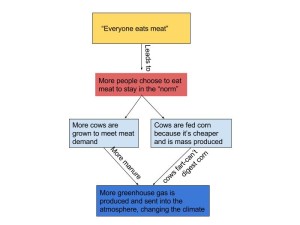This is a very interesting time for this module to come up because I am currently not eating any meat in my diet. For the religious holiday of Lent, which lasts for 40 days, I have given up eating all meat. This has been a very interesting experience because I am going against the social norm. The social norm in this area, (Penn State, University Park), is that everyone eats meat. When you choose not to eat meat you are in the minority of people, and often times people treat you differently for it. Whenever I tell someone that I am not eating meat they look at me like I have 5 heads. No one wants to feel as if they are different or acting weird, so they just go along with the social norm. They will do anything to be “normal” even if it means eating certain foods, which is how this social norm affects food choice. I am going against the norm, and trying to stay strong with my own eating habits.
The social norm in this situation is that everyone eats meat. If this is the norm and people want to be “in the norm” then this leads to more people choosing to eat meat. By choosing to eat meat, this effects many societal issues in the United States, a major one being climate change. The world’s climate is constantly increasing, and eating meat has a lot to do with that. Not only does transporting the meat create pollution, but cows produce methane gas while digesting the food the eat. In the US, cows produce more greenhouse gas then 22 million cars in a year. All of this greenhouse gas goes up into the atmosphere and plays a huge role in the climate change. The social norm should be that everyone eats more fruits and vegetables, and not meat. If the social norm was to not eat meat, then less people would do it, and the demand for meat would decrease. This would lead to feeding less cows, and ultimately les green house gas released into the atmosphere.


Hey! My name is Katy. I wanted to comment on you post, since I do not eat meat on Fridays during Lent either. Normally I give up something for the 40 days, but this year I decided to start thinking more positive. However, in my hometown outside of Pittsburgh, It is a social norm to not eat meat on Fridays of lent. Almost all of the churches in my area and many of the restaurants have fish fries on Fridays during lent. The fish fries have more than just fish, they serve homemade pierogies, mac n cheese, haluski (cabbage and noodles) and many more options. In my post, I wrote about how being in college and having a fast paced lifestyle has changed how I eat. You can read my post here, https://wp.me/p3RCAy-bJ2
Hi, I really liked your blog post. It was similar to mine. I don’t eat meat during lent either, though I only do it on Fridays. Then I also give up something else for the 40days. Not eating meat is hard, but I suppose it must get easier the longer you go without it. I enjoyed your diagram too, I liked how you used different colors.
Check mine out at https://sites.psu.edu/geog30/?p=44912&preview=true
Hey Christopher, my name is Alyssa Gammel and I though that your post made some not obvious, but necessary connections from what we as humans consume, to the climate and environment where we live. First, I think its awesome that you are not eating meat for Lent. I give up meat on Fridays, part of how I practice lent, and I know that just doing that for one day is hard. But I definitely agree that eating meat is a social norm. Most of the time we event get it on our salads! Second, your diagram really makes your post clear and shows how simply eating meat is hurting our environment! Well done! Heres a link to my blog:https://wp.me/p3RCAy-bG3
In my blog, I talk about how in the South, the social norm is the “Southern Hospitality”. Because of this, the people choose to serve foods they consider to be hospitable and appropriate for gatherings, but a lot of the times these “soul foods” are very unhealthy and can lead to obesity.